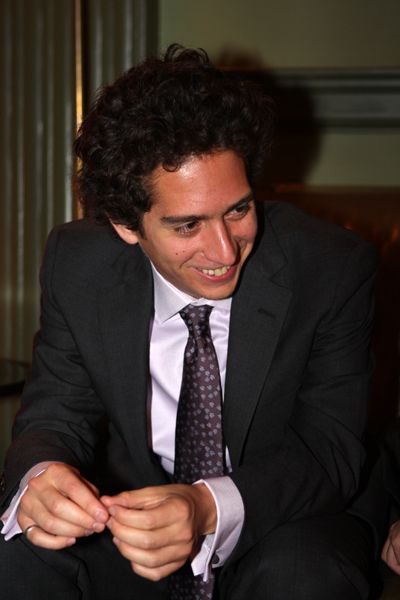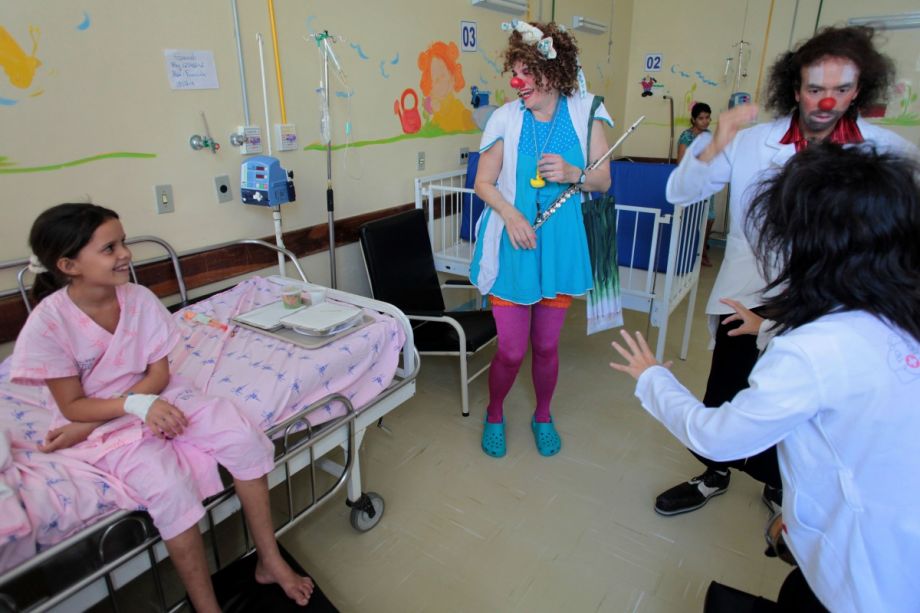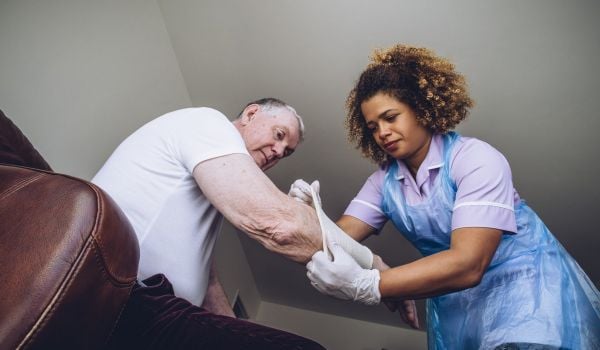It’s a story with relatable, if dramatic, themes: A man grieves for his deceased father, revisits his painful childhood, struggles with surviving family. But City of Clowns, a graphic novel published in Latin America in 2010 and re-released late last year in the U.S., hinges on a phenomenon that many in America might find strange: deliberate, dedicated clowning. The book is studded with clowns who perform on buses, drink in bars and even lead street protests. And although City of Clowns is fiction, its author, Lima-born journalist Daniel Alarcón, says there’s nothing fantastical about the clowns in Peru: “I doubt I would have had the courage to make that up.”
Across Latin America, clowns are a legitimate subculture who occupy multiple places in society: They’re beloved entertainers, elected officials, religious pilgrims, and even an important part of healthcare.
Alfonso Silva-Santisteban, a doctor involved with international medical clown groups Bolaroja and the Gesundheit Institute, explains why clowns are a big deal in Latin America — and how they can help global health achieve its goals.
What’s your background and your medical specialty?
I’m a physician. I’m an epidemiologist. I work mostly on public health. I’m in HIV research here at my university. And I was with Bolaroja, which is a local clown organization. I started in 2002. And we’ve been working with Gesundheit since 2003. Then we started with trips to Quito in 2006. And then I’m mostly involved in those trips, which is once a year in August, when we have this festival.
And on those trips, people come down to Lima, is that correct?
Yes, it’s made by Gesundheit and Bolaroja, from here, but it’s people from 10 countries or more.
What’s the purpose of those festivals?
Bolaroja is an organization that mainly does hospital clowning. And [with] Gesundheit has we have two weeks of activities with the community [in Quito], clowning every day, workshops with mostly kids but also some adolescents. At some point in the past years, there was a more concrete objective of [developing a] community organization for health. We started working with the Pan American Health Organization. … Now there are two people, there’s going to be four now, from Gesundheit, who are living in Quito and working with the community every day. So the goal would be sharing experience, as clowning is, and … for clowning to establish some sort of bond, and then we have had some goals. For example, we have been doing for three, four years, workshops with adolescents on sexual health, using clowning as a tool.
What does clowning add to the workshops?
The philosophy of clowning or one of the main things you should do when you are clowning is that, first, you are who you are, and you are there to offer what you have. And then you lose fear … of ridicule, and then you always establish a horizontal link to whoever you have in front, right? You always start from where the people [are]. You read your audience. And that is how you engage with a community, especially if they are disenfranchised, especially if you don’t know them, especially if you are foreign and you want to do some work.

Journalist Daniel Alarcón (Photo by Christopher Peterson)
So for me it makes a lot of sense to use those values, besides using them when doing clowning, to use them in the work of public health. One of the things you always see is this kind of vertical, hierarchical imposition, programs that sometimes look like charity, that have very short-minded goals, you know? And then people say, this hasn’t worked as we want it to. In this case, it’s more of a process-type perspective, engaging with people with whom you want to establish common goals. So clowning is a very good facilitator of that type of relationship.
The psychiatrist who is now doing some community psychiatry in Belen [Ecuador] for some years would say that, from sharing that humanity you can start building much more. As beautiful and sophisticated and well-thought-out a project can be, it’s harder to have those kind of human connections when it’s more a professional type of position — aid worker versus recipient, community leader versus [follower]. But when you have two people having fun? The idea of being a clown is that you can control that and engage in a relationship. So the bond is different.
You’re an epidemiologist. Are there studies that establish the impact of this?
There are. There was one study some years ago that a pediatrician, he’s also a member of Bolaroja, showed that having the clown around the services decreased anxiety. Argentina I think has done some work, because they had a law last year requiring to have clowns in hospital services, especially with children. But in the end it’s also a matter of common sense, right? It’s the kind of thing where, science will let you know why music makes you vibrant. But just hear the music and feel the thrill.
In the U.S., clowns are sometimes feared or disliked. It seems like it’s quite different in Latin America. Can you talk a bit about the contrast?
Yes. I think the clown that is more known in the U.S. is like the white-faced, circus-type of clown that is like between a clown and a jester, a buffoon, right? Here in South America, it’s more like the European type of clown. They are more introspective, less loud. So I think that a lot of people have connected with this idea of horizonality, of collectivity, of vulnerability, because it’s also a therapeutic process and it’s really fun.
What’s the future of clowning in Peru and around South America?
I was just a month ago in Brazil in a huge encounter called Emergencias, and it was more like political work [or] activism, but I think the core there was culture [and] diversity. I think that more people are realizing that even if you are a clown and you are a social worker, we are part of the same environment, [saying], “I don’t know if I want to live in a world where all these rules are applying of success, of money, of power determined by how much was your annual income.”
You also see that even in public health, in sort of developing work, aid, and I suppose this is also a way to connect. You do have the opportunity to travel, to engage with disenfranchised communities, to learn a lot and to share. … I would not say that there is a common political goal that clowns want to organize and take over power (laughs), but I think it will involve more work.
The “Health Horizons: Innovation and the Informal Economy” column is made possible with the support of the Rockefeller Foundation.

M. Sophia Newman is a freelance writer and an editor with a substantial background in global health and health research. She wrote Next City's Health Horizons column from 2015 to 2016 and has reported from Bangladesh, India, Nepal, Kenya, Ghana, South Africa, and the United States on a wide range of topics. See more at msophianewman.com.
Follow M. Sophia .(JavaScript must be enabled to view this email address)

















